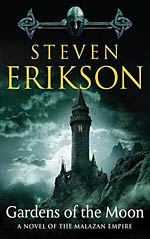
![]() bazhsw
bazhsw
11/11/2025
![]()
What a fascinating, and rather brilliant epic fantasy book this is! I can see why it is incredibly polarising and I can see on another read that I wouldn't like it but having reached the end, all I can say is that I found it's complexities fascinating and staying the course rewarding, rather than frustrating.
As other reviewers will state, it kind of feels pointless doing a plot summary here. The book broadly centres on a military campaign from the point of view of a colonising Empire, as it focuses it's attack on a specific city and also the politics of that city as power brokers endeavour to gain influence and control. It's the final book of my 2025 grimdark challenge, and whilst it isn't what I would call 'gritty and grimy' it has a lot of the tropes I enjoy - lots of shades of grey, lots of complex motivations and back stabbings, a fair bit of violence, and a sense of a world that struggles to find hope. I'm also coming of being disappointed by 'military fiction where gods are using people as pawns' with Glen Cook's 'The Black Company' so as I realised I was in for more of the same I thought 50 pages in or so that I was going to hate this.
I didn't. Upon reflection, the characterisation isn't great, and there isn't a lot of depth or sense to care about individuals and at times the book is quite frustrating but it's complexity and different strands to the overarching plot is rather wonderful. Gardens of the Moon is the kind of book where you are given a huge list of characters at the start of the book and you have to refer back often (especially in the first third of the book). It's a book that crosses continents, a book that has an incredibly detailed pantheon (well technically, pantheons within pantheons), a book which has a very complex magic system and all of it is named in 'fantasy naming conventions' which mean you have no idea what they are. People will say, 'well it doesn't make sense until you've read it twice and the rest of the series' and whilst I enjoyed the book life is to short to read something like this twice.
That said, I enjoyed taking my time, trying to work out the different plots and relationships. It does get easier as you go, but I was about half way through the book when I wished I had drawn a relationship map and noted 'who knew what about whom', and mapping each character's feelings and motivations and plans towards other characters. If this sounds fun this is a book for you. If it sounds like hell then leave this one alone.
The book also has tropes which often piss me off. Hyper powerful characters (there is a demon / god who lives in a giant moon and can kill thousands in the blink of an eye), gods who make the actions of the little people meaningless, wizards who can blast shit to smithereens and time travel, come back from the dead, turn into a puppet or whatever. And yet this book doesn't feel like a mess, it's coherent, it hangs together and for all these hyper powerful characters there is usually something bigger or meaner around the corner.
It is hard to keep track of, sure, and Erikson drops you right in the middle of a battle and there is immediate treachery and it's not clear what's going on. I get the criticism that it's not easy but honestly, it isn't that hard either. If you like a bit of confusion in your reading and feeling like you're in a permanent fog of war then this is a great book for that. As a reader you do have to work things out for yourself, but the book isn't impenetrable. I kind of loved it.
There is stuff in here that will infuriate, but I loved the sense of convergence. Even though you'll get little side paths about stuff that happened thousands of years ago, or the odd race or character being introduced out of nowhere, rather than start small and go big - like a lot of fantasy novels do with the hero's journey, Erikson starts big and zooms in. Most of the book zooms in eventually to essentially a garden party! I thought it was rather cool how different threads were brought together.
'Gardens of the Moon' is a book to explore, to wander with, to observe, as hundreds of crazy things happen all at once. It's a Goldilocks book in the sense that if I think too hard I'll find things I hate, and if I don't think then it'll annoy me but when I think 'just the right amount' I find I've had a great time with this novel and maybe one day I'll pick up the second.